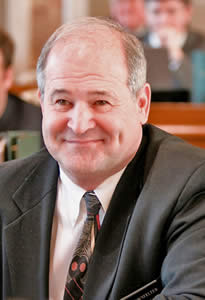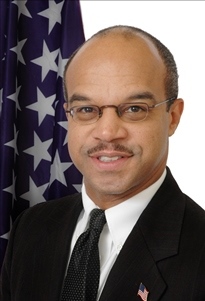

Bill advances in Legislature
An abandoned housing bill advanced recently in the Kansas Senate and is expected to start working its way through the House this week.
The bill’s passage in the Senate Feb. 23 was a departure from previous years when efforts to expedite action on abandoned housing met with resistance there.
Two Wyandotte County legislators found themselves on opposite sides of the effort to get vacant deteriorating houses out of the hands of owners more quickly and into the hands of agencies that would rehabilitate the homes.
Rep. Stan Frownfelter, D-37th Dist., has been working for years on bills to expedite taking abandoned and blighted property away from owners who don’t live in the homes, and get the properties fixed and back on the market.
Rep. Frownfelter said this bill is slightly different than past versions, as there were concerns included from Realtors, landlords and conservatives in it. The idea has been vetted for a number of years, he added. Sen. Haley said another difference is a lobbyist helped get the bill through the Senate.
“We’re trying to repair our communities,” Rep. Frownfelter said. Redoing part of a neighborhood changes the outlook of other people in the neighborhood, who then clean up their property, he believes.
“It’s hard to make people proud of the community when you have obstacles in the way,” he said. “People take more pride in their streets and being able to do something with them.”
Sen. David Haley, D-4th Dist., has been blocking those bills in the Senate in order to protect property owners’ rights. The bill passed the Senate 32-8 on Feb. 23 over Sen. Haley’s strong protest.
“This chamber now further denigrates real property rights to which every Kansan should be heir,” Sen. Haley stated in his protest. “SB 338 which purports to grant authority to cities and nonprofit organizations to petition courts to possess vacant property for rehabilitation purposes will, simply, but legalize grand theft.”
It was Sen. Haley’s opinion that adequate laws already exist to deal with abandoned property, including code enforcement and also a law that lets property with two or more years of delinquent taxes be sold by the sheriff at a delinquent property tax sale.
“The principles of real property ownership should always inure to the rights of the citizen not to a developer’s bottom line or even a desire to enhance appraised valuations for tax purposes,” Sen. Haley stated in his protest.
However, Rep. Frownfelter and some community residents here have argued that abandoned properties are sitting for too long before they are restored. Some of them have attracted crime, vagrants, vandalism and drugs to neighborhoods, according to Rep. Frownfelter. They also have pulled down property values of surrounding homes.
Details of bill
The bill, or ones like it, for years has had the support of the Unified Government Commission, which spends considerable time discussing how to remove blighted properties. The UG has moved codes cases to an administrative hearing, has recently implemented other expedited methods for its Land Bank, and most years allocates funds for demolition in its budget.
This year’s version of the bill outlines a process where vacant homes could more quickly be taken away from absentee owners and eventually put into the hands of nonprofit agencies that could rehabilitate them.
The bill adds a new definition for abandoned property. It keeps the former definition of abandoned property, which is “any residential real estate for which taxes are delinquent for the preceding two years and which has been unoccupied continuously by persons legally in possession for the preceding 90 days.”
Then a new definition of abandoned property is in addition to the previous one: “any residential real estate which has been unoccupied continuously by persons legally in possession for the preceding 365 days and which has a blighting influence on surrounding properties, unless the exterior of the property is being maintained and the property is either the subject of a probate action, action to quiet title or other ownership dispute, or the property is subject to a mortgage.”
There is also a definition for commercial abandoned property, which includes delinquent taxes for two years and which has a blighting influence.
Either of the definitions could apply if the bill is passed.
The difference is that residential property with paid-up taxes could be taken now if it was unoccupied for a year and had a blighting influence, under the bill.
A city may file a petition with the district court for an order of temporary possession of an abandoned property, under the bill’s new provisions. The city’s governing body would have to approve this petition.
A year later, a nonprofit agency would seek quiet title to the property, and the court would rule on that. Nonprofit agencies could turn the abandoned housing property into housing, infrastructure, parks or parking spaces, according to the bill’s new language. If the court finds the organization did not rehabilitate the property to its rehabilitation plan, the property would be sold immediately or placed in a tax foreclosure sale, according to the bill.
Different perspectives
Rep. Frownfelter and Sen. Haley, although living in the same city, have very different perspectives on this issue.
Rep. Frownfelter points to family property that he rehabbed in the Highland Crest area on the south side of Kansas City, Kan., where a lot of tract homes were built after the 1951 flood. Many of those homes are now in need of rehabilitation, he said.
He rehabbed a small house that his parents bought in 1952, expanded it to include more space, gutted it and modernized it.
The community doesn’t so much need to build new housing as it needs to rehab existing housing, he believes.
Rehabbing small homes can be less expensive than tackling some of the older, larger homes, he said.
Sen. Haley has some properties in the northeast area, some he has been handling for friends, and he has plans to fix them up. But some of them have been cited previously, and as he has said in previous media reports, he needs more time to do the work on them. Some former senators also have done rehab work on older buildings.
In Sen. Haley’s view, some homes in the area just need a little fixing up, and do not necessarily need to be torn down. For those who are trying to do the work themselves, an entrepreneur or an individual, that may take a lot of time.
Rep. Frownfelter said abandoned housing has become an epidemic throughout the state, with rural communities facing similar problems now.
He said the cities already have the right to tear down property.
“We’re trying to get there before they get to that point,” Rep. Frownfelter said. “We need to get into them early enough to rehab them.”
“What I’m hoping is some of these banks and people out of state can’t sit there and say they don’t have to do anything about it,” Rep. Frownfelter said. He wants these owners to be brought in and told that they have to do something about the property within a certain period of time.
For those do-it-yourselfers who are taking a long time in getting the homes fixed up, they might be going in front of a district judge to make that decision for them of how much time they have to fix it up. “They’re (the judges) going to be reasonable,” Rep. Frownfelter believes.
He said if someone is living in the house, their property would not be taken away from them.
Sen. Haley stated that property owners with average income or who are poor who are trying to hold onto inherited property, or those who hope to fix up old properties as small entrepreneurs could be “set upon by keen-eyed, out of county based developers sheltered by an industrious ‘not-for-profit’ which uses the city and district court as the leverage to harass and ultimately take the land, all in the name of ‘civic pride’ or ‘community betterment.’”
Sen. Haley said the late civil rights leader Bernard Powell warned about the transfer of inner city property back into the same hands of those who fled the cities a half-century or more ago to the suburbs. He warned that those residents who have weathered poverty and hard times and yet still held onto some property could be forced out. Powell warned of prosperity returning to the inner city, with nothing being tendered for the people who owned the land. “He called it government assisting the turning of the ‘ghetto into a goldmine.’ How prophetic.”
Sen. Haley also recalled the use of eminent domain that took property away from private landowners in order to build the Kansas Speedway area in Kansas City, Kan. The argument was also used then that it was acceptable because the new value of the property for commercial use would be greater than its old value as homes.
The situation with Kansas Speedway area homeowners is not completely like the situation with abandoned homes, however. Many of those homes near the speedway were in good shape and the homeowners were paid something. Sen. Haley said he is concerned this current bill would not compensate the current owners at all.
Sen. Haley said if people fancied to themselves that they could do a fixer-upper with their inherited property and are in the middle of the project, they might find themselves in court suddenly having to explain themselves time and again.
How the bill affects finances
A legislative fiscal note with the bill stated that all cities have abandoned property that may be affected by this bill. However, the fiscal effect could not be determined, according to that fiscal note.
Until recently, much of the work involving code enforcement and housing in Kansas City, Kan., has been handled at the municipal court level, which is funded by the city. Just recently, the Unified Government has begun transferring code enforcement cases to an administrative hearing within code enforcement.
This proposed bill would require these specific abandoned housing cases to go to the district court, which is funded by the state. No mention in the fiscal note was made of the state’s future expenses for district court as compared to any current local expenses, or whether there would be a shift of costs from local government to state courts.
A frequent topic at the UG meetings
How to stop blight is a frequent topic at the Unified Government meetings.
At tonight’s UG Neighborhood and Community Development Committee meeting, UG officials outlined some plans for UG departments to work together in addressing blight. Recently, they have been cracking down on inoperable vehicles, and are emphasizing cleaning up trash.
UG officials said they demolished about 62 buildings last year. There may be another 100 structures added to the list last year, officials said. There was no increase in the demolition funds available this year, according to officials. To catch up on demolition of residential structures on the list, it would probably take $2.5 million, according to UG officials.
“We’ve got to put more resources on the front side of this and stop them from sliding toward demo,” Commissioner Brian McKiernan said.
McKiernan said there was a need to gain control of abandoned structures that are not in tax sales. It will require some seed money to exhaust the resources that are available to the local government, he said.
According to UG code enforcement officials, some of those ways that are now available, without changing the law, to address blight include a legal process to raze property, addressing inoperable automobiles, and abating trash if owners do not take care of it.
“We’re a long way from solving everything,” Commissioner Ann Murguia said. She said you don’t have to look for blight in Kansas City, Kan., — it jumps up and hits you in the face.
“The No. 1 call I receive as an official is residents’ concern with blight in our community. I hear the same thing every year, we don’t have the ability to address these issues.” She added she doesn’t buy that because other communities don’t have the issues Kansas City, Kan., has.
Every year she hears that conditions will improve, but she really doesn’t see it on the ground, she said.
“I don’t want to be cynical but I have yet to see an idea that’s making a difference,” she said.
Commissioner McKiernan said the UG needs to see if there are some tools it has, such as tax tools, that are not currently being used.
McKiernan said he was talking with a UG employee about a house that burned down recently and will be demolished at the UG’s expense. It was vacant four years and tax delinquent, and the UG didn’t move on it. A vagrant started a fire and it burned down, he said. Now the appraised value of that block is down $75,000, he said. That’s $15,000 in property taxes the UG can no longer collect. If that happens in every block in the district, “it will pull us all in,” he said.
What’s next for this issue
Because the bill passed the House in other forms in previous years, it has a chance of passing this year, according to Rep. Frownfelter and Sen. Haley.
The bill was referred to the House Committee on Commerce. It has a hearing scheduled Wednesday, March 9, in the House at 1:30 p.m. in Room 346-S.
If the bill passes and is signed into law, it would go into effect July 1.
To see a copy of the bill, SB 338, visit http://www.kslegislature.org/li/b2015_16/measures/documents/sb338_01_0000.pdf
To see the supplemental note on the bill, visit http://www.kslegislature.org/li/b2015_16/measures/documents/supp_note_sb338_01_0000.pdf
To see the fiscal note on the bill, visit http://www.kslegislature.org/li/b2015_16/measures/documents/fisc_note_sb338_00_0000.pdf
To see Sen. Haley’s written protest, visit the Senate Journal at http://www.kslegislature.org/li/b2015_16/chamber/documents/daily_journal_senate_20160223135539.pdf, on page 1952.



